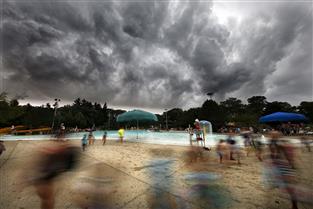Wauwatosa homeowners know that winter is coming, and, in addition to colder temperatures, so is their gas bill. Homeowners can ease the pain of a high gas bill through different means, but they have to be careful that they don't invite other problems.
The Milwaukee National Association of the Remodeling Industry held a seminar Sept. 19 offering these tips:
What to do
Have the right thermostat.
There are thermostats on the market with programmable artificial intelligence. If you want your house to be 70 degrees at 7 a.m., you just punch in the time and temperature and the thermostat will start warming the house at 5:45 a.m. If it doesn't reach its mark on time, it would adjust and begin heating the house at different time the next day.
Use a modulating furnace.
The former furnace model was to blast hot air through the house at different intervals. The new model is more efficient, blowing a steady stream of hot air, gradually heating the house.
Consider hydronic in-floor heating.
It's is the most efficient way to heat a house but also comes with the highest upfront cost. The system runs hot water through a series of tubes under the floorboards. Kevin Amundson, co-owner of Owner Assisted Remodeling in Elm Grove, said on hydronic in-floor: "If you do a cost-benefit analysis, retrofitting doesn't usually come out. It's a phenomenal way to go if you're building a new home."
What not to do
Don't over-ventilate your attic.
An over-ventilated attic will get wet, according to Mark Meiling, who has been testing homes for energy efficiency since the late 1970s.
"As we are adding more insulation to our houses, we make the building materials on the cold side of the insulation colder than they have ever been," he said.
Condensation is the reason why attics become wet, and then moldy. It happens when the interior air carries moisture from daily activities to the colder outer shell of the building.
Meiling likened the effect to dew on grass. When wet air touches the cold grass, condensation occurs and creates dew.
"You don't hear anyone saying that we should ventilate the grass," he quipped.
The best way to keep your house warm is to seal up the outer shell. Doing so will not only prevent a moldy attic but stop hot air from leaking out.
Don't seal the holes in your houses too much, Meiling warned, adding that too tight of a home could carry the threat of carbon monoxide poisoning.
Don't leave everything plugged in.
Phantom load isn't ghosts turning your lights on, but rather power drawn from things you leave plugged in. Anything with a remote needs a small amount of electricity for it to work and cellphone chargers use up a little bit of current as well. According to the panel, these little things can add a lot to your energy bill.
According to the panel, the main activity to save energy is to be mindful of your consumption. Daily habits like turning off power strips, lowering your thermostat and turning off your water heater when you're gone can save a little every day, which can add up to bigger savings in the long run.
More from News and Features
- Anodyne Coffee plans to open location in Wauwatosa Village
- Wauwatosa Meetings: Aug. 4
- Video: Wauwatosa girl's curbside ice cream stand raises money for the hungry
- Wauwatosa News and Notes: Hands-only CPR training offered; Firefly Art Fair is Aug. 6-7
- Wauwatosa Ask Now: Why are there barriers and fencing along the North Avenue bridges over the Menomonee River?
- Mystery Photo Contest: July 28
- Wauwatosa gears up for National Night Out event, this year at the zoo
- Election 2016: Wisconsin's 4th District candidates weigh in
- Wauwatosa's Luther Manor residents share smiles through flower delivery
- Wauwatosa Police Report: July 17-23














